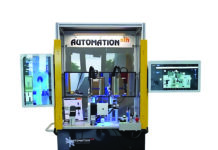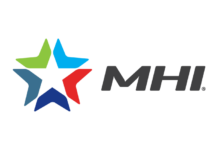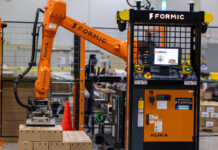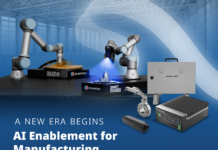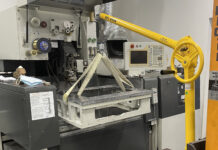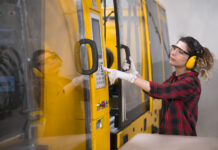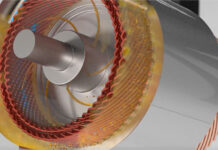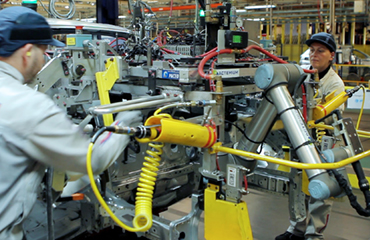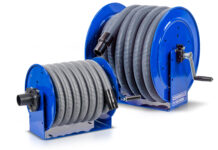With significant results in just eight months, PSA Group will modernize all of its European manufacturing sites with its patented production system that integrates UR robots
PSA Group—Europe’s second-largest car manufacturer with brands that include Citroën, DS, Peugeot, Vauxhall and Opel cars—is increasing factory performance and reducing production costs as part of its “Excellent Plant” initiative, utilizing Universal Robots (UR) to help drive the project’s success. Results of the new robotic assembly system include improved worker ergonomics and cost savings of two to eight Euros per car, which represents up to 400,000 to 1,600,000 Euros in initial cost savings. The automated UR robot system also aids producibility through a 10 percent improvement in geometric dimensioning and tolerance (GD&T) and has an excellent operational yield, with no failures reported in the first year with over 200,000 cars produced.
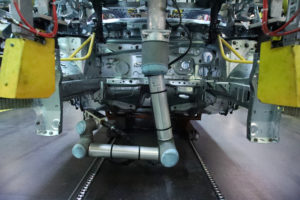 “We chose the UR10 robot for its reach, ease of programming and safety, but we’ve been extremely impressed with how quickly this initiative paid for itself,” said Cedric Grandjean, Architect Element Specialist, Finish Assembly Line at Groupe PSA. “Typically, when we implement new robots, we expect an initial loss in production that is made up over time, but that didn’t happen in this case. In fact, our return on investment has been between six months and one year, depending on the site where the robots are deployed.”
“We chose the UR10 robot for its reach, ease of programming and safety, but we’ve been extremely impressed with how quickly this initiative paid for itself,” said Cedric Grandjean, Architect Element Specialist, Finish Assembly Line at Groupe PSA. “Typically, when we implement new robots, we expect an initial loss in production that is made up over time, but that didn’t happen in this case. In fact, our return on investment has been between six months and one year, depending on the site where the robots are deployed.”
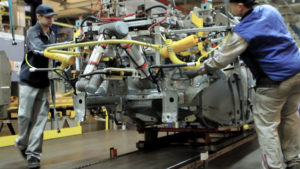 Group PSA first updated its site in Sochaux, France, which manufactures 400,000 vehicles per year, with a new assembly line that incorporates UR10 robots in a unique collaborative screw-driving operation. The robots, which boast a reach of 1300 mm/51.2 inches, are mounted on a moving platform that goes under the vehicle in production. Operators pullthe vehicle into place and the robot manages the ergonomically challenging screw-driving operation under the vehicle while the workers continue with other assembly tasks. The collaborative robots include built-in safety mechanisms that allow operators to work alongside the automated system without risk of injury. While the robotic system requires flawless execution for the complex task, it took only a month for Group PSA engineers to program due to the robots’ ease of use. The entire system was implemented throughout the Sochaux site in only eight months. Group PSA has since filed national and international patents for the entire unique application, including the integration of the UR10 robots, deploying the system throughout its European plants in France, Spain and Slovakia.
Group PSA first updated its site in Sochaux, France, which manufactures 400,000 vehicles per year, with a new assembly line that incorporates UR10 robots in a unique collaborative screw-driving operation. The robots, which boast a reach of 1300 mm/51.2 inches, are mounted on a moving platform that goes under the vehicle in production. Operators pullthe vehicle into place and the robot manages the ergonomically challenging screw-driving operation under the vehicle while the workers continue with other assembly tasks. The collaborative robots include built-in safety mechanisms that allow operators to work alongside the automated system without risk of injury. While the robotic system requires flawless execution for the complex task, it took only a month for Group PSA engineers to program due to the robots’ ease of use. The entire system was implemented throughout the Sochaux site in only eight months. Group PSA has since filed national and international patents for the entire unique application, including the integration of the UR10 robots, deploying the system throughout its European plants in France, Spain and Slovakia.
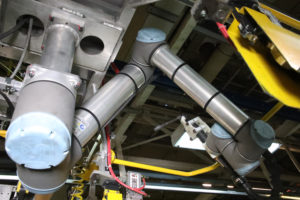 “The earliest use of robots was in the auto industry, but the vast majority of these automation applications are in the heavy body and paint shop part of production, while assembly predominantly still uses manual labor,” said Jacob Pascual-Pape, General Manager of Southern Europe operations at Universal Robots. “That makes this application highly significant. UR cobots are now taking over tasks such as intricate screw-driving on the automotive assembly line, relieving workers from ergonomically unfavorable work in a production environment that isn’t conducive to traditional industrial robots.”
“The earliest use of robots was in the auto industry, but the vast majority of these automation applications are in the heavy body and paint shop part of production, while assembly predominantly still uses manual labor,” said Jacob Pascual-Pape, General Manager of Southern Europe operations at Universal Robots. “That makes this application highly significant. UR cobots are now taking over tasks such as intricate screw-driving on the automotive assembly line, relieving workers from ergonomically unfavorable work in a production environment that isn’t conducive to traditional industrial robots.”
About Universal Robots
Universal Robots was co-founded in 2005 by the company’s CTO, Esben Østergaard, who wanted to make robot technology accessible to all by developing small, user-friendly, reasonably priced, flexible industrial robots that are safe to work with. Since the first collaborative robot (cobot) was launched in 2008, the company has experienced considerable growth with the user-friendly cobot now sold worldwide. The company, which is a part of Teradyne Inc., is headquartered in Odense, Denmark, and has subsidiaries and regional offices in the United States, Germany, France, Spain, Italy, Czech Republic, Turkey, China, India, Singapore, Japan, South Korea, Taiwan and Mexico. In 2017, Universal Robots had a revenue of USD 170 million. For more information, please visit www.universal-robots.com or read our blog at blog.universal-robots.com.

